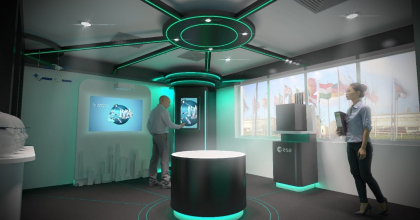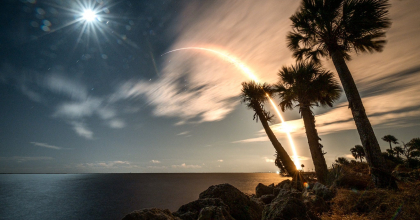60 persons attended the event which brought together experts from the satcom and automotive industries and the European Commission. The workshop served to be a venue to network and gain knowledge on market trends the automotive sector as well as to hear and express views.
|
A market survey was carried out before the workshop to collect information and experiences and determine areas of future interest for consumers. This combined with the workshop helped provide understanding of the interest car industry players have in space based applications. |
Gaining insight into the potential contribution of satellite based solutions for the automotive industry and end-users will be the key to continued growth of the European satcom industry. Multimedia applications, navigation systems and Mobile Communications can all play an important role in achieving this.
|
Mr Juhanni Jaaskelainen (image left) of the European Commission outlined the main areas of EC concern; that of reducing congestion, decreasing fuel consumption and increasing safety on European roads. The "i2010 Intelligent Car Initiative" envisages new services like emergency calls, adaptive cruise control, better traffic management. |
One major issue to deal with is the raising of awareness within the user community to stimulate demands originated by the users versus the car manufacturers helping to implement new services faster.
| Mr Didier Cruse (image right), Chief Strategy Officer for Citroen stated his companies commitment to being open to new technologies and welcomes any new initiative to improve safety. He highlighted 'E-Call' or 'Emergency Call', a new safety feature planned for implementation into every new European Citroen by 2009. |
|
Mr Jose Papi (image left) of the European Road Federation (ERF) expressed his organisation's desire that all members of the value chain contribute to establishing a viable satellite service to vehicles. This includes not only vehicle manufacturers but also service and technology providers. |
The ERF has recently launched a project supporting "GNSS Introduction in the ROAD Sector" (GIROADS) by implementation of pilot applications and field tests. So far, 31 organisations from 8 countries including China are participating in this project."
|
Other speakers included Mr Heiner Schmeck (image right) of Dornier Consulting who emphasised the need for satellite links to vehicles if embedded software updating technologies were to proceed. This new innovation can update a vehicle's software without requiring a visit to a mechanic and can be implemented over a satellite link. |
Digital Radio was also a topic of discussion. Mr Phillip Saint Martin of NAVTEC reported on his company's experiences in the US market with digital radio via satellite otherwise known as xm radio.
|
ESA supported projects |
|
Two other companies with ESA Telecom supported projects were also in attendance. JAST Antenna Systems of Switzerland have recently completed field trials with a prototype of their flat multi-band antenna system for vehicles. The definition of an industrial version is in progress. Similarly, ERA of the UK has developed a low-cost and ultra-low profile antenna for direct TV satellite broadcast to vehicles. ESA telecom supports a number of projects in the area of Automotive Applications, to view them all just click under related links at the top-right of this page. |
 ESA Telecom supported projects |
Audience Feedback:
Comments from the audience ranged from 'What do drivers really need' to 'What are they willing to pay'. For their part Automotive Representatives suggested that stake holders and Government should financially support services. Insurance companies it was suggested, because they would be major beneficiaries, could contribute to E-Call and other such security related services.
"A User-awareness initiative is one thing", opined one participant, "But accurate pricing remains a challenge. Affordable technologies in the automotive industry need to be packaged such as it is done with mobile phones."
Free services such as E-Call were on the technology wish list for several participants, including Mr Roger Paguy from the French Ministry of Transport. He also expressed a desire for other technologies which would reduce travel time through improved navigation, as well as tolling systems to avoid queues and more leisure oriented services such as improved radio channel availability.
|
Mr Pierluigi Mancini (image left), Strategy Manager for ESA stated that: "This has been an excellent opportunity to get together with players in the automotive and satcom fields and has been very important for future discussion." "Complementary to the traditional technology push action ESA is promoting a user driven strategy that has the ambition to federate the user demands in order to develop sustainable satcom based services. It is in this framework that this event should be placed. |
"ESA together with the industrial partners, namely Alcatel Space and EADS Space Services is delighted to acknowledge such a large user participation."
All presentations from the MMSA workshop are online and can be downloaded by clicking on the link at the top-right of this page.
images courtesy of MSAA and ESA











